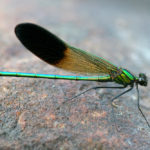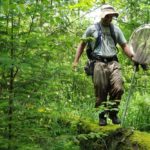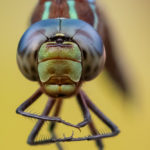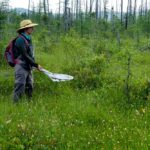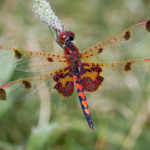Dragonflies & Damselflies: Identification and Field Techniques

Instructors: Bryan Pfeiffer
July 10-12 | $425 | CANCELLED. Check back in 2021!
Course size: 12 students
H
eld during peak flight season, this three-day seminar presents range of skills and ideas necessary to discover, identify and enjoy dragonflies and damselflies (order Odonata). Lecture topics include anatomy, taxonomy and ecology. In the field, we will cover practical skills for locating and identifying members of nearly every odonate family on the continent. Designed for beginning and advancing odonatologists, and for collectors and observers alike, the course will include catch-and-release identification, specimen collection and curation, basic nymph identification, and (for those interested) field photography. Students will also discover that the best way to learn these insects is to join them in wetlands, rivers and ponds. As odonatologists like to say, “Good things come to those who wade."
Course Goals
- Beginning students will become familiar with every Odonata family and many key genera living in any particular region of the U.S. and Canada.
- Advancing students will work with the instructor on a plan to improve their knowledge of particular taxa, solve classic identification challenges, or on other objectives of the student’s choosing.
- All students will gain the field and intellectual skills to progress on their own after completing the seminar.
Course Objectives
- Confidence — During lectures and field excursions, students will recognize that this particular insect group is not that difficult to learn.
- Physicality — Although most dragonfly species can be identified visually in the field, there is no better way to learn these insects than to catch and examine them in the hand.
- Practicality — Students will learn to right field techniques and identification characteristics across varied natural communities and odonate taxa. In other words, we adapt to the insects depending on where they are what genera we might be pursuing.
- Wonder — We will celebrate what are arguably among the most dramatic and audacious insects on the planet.
About the Instructor(s)
With net and camera in hand, Bryan Pfeiffer has chased dragonflies from tropical forests to above the Arctic Circle. But he shares an equal passion for teaching. For more than three decades, Bryan has offered field seminars and workshops in birds, insects and photography to students of all abilities. As a consulting field entomologist, he has pursued butterflies and dragonflies for state and local governments, the U.S. military, private landowners, and conservation groups. A former faculty member in the Field Naturalist and Ecological Planning Program at the University of Vermont, Bryan is a principal investigator for the Vermont Dragonfly and Damselfly Atlas. His book in progress is provisionally titled “PANTALA: What a Globe-trotting Dragonfly Tells Us about the World.” Find Bryan online at www.bryanpfeiffer.com.
Meals
Coffee, tea, and light breakfast fare included with course fee. Picnic lunches and a catered, buffet-style dinner (Friday and Saturday) are also included. Participants may opt out of meals and provide their own food instead. Those declining the included meals will be reimbursed for a portion of the course registration fee.
Required Materials and Recommended Reading
Before the course begins, each student will be provided with a packet of readings (including field gear suggestions) and essential anatomy illustrations to be used in the field. Although it is not required, beginning students living or working in the Northeast would do well to purchase the Field Guide to the Dragonflies and Damselflies of Algonquin Provincial Park and the Surrounding Area. (Contact the instructor for a discounted price.) Students from outside the Northeast can bring any appropriate field guide. Your instructor will make his extensive Odonata library, specimen collection, and field supplies available during the seminar.
Timing
Course begins 9 AM on July 10 at North Branch Nature Center and concludes by 5 PM on July 12. Dinner on Friday and Saturday are at 6 PM. All other timings are at the discretion of the instructor.
Academic Credit / Professional Development:
This course qualifies for 2 graduate-level science credit for an additional $300 course fee. All BioU courses are accredited by Castleton University. It is the student’s responsibility to ensure that home institutions will accept the credit. Participants pursuing academic credit will be required to complete an additional assignment above and beyond the course hours, including literature review, reflective writing, or a field-based project.
This course qualifies for 30 hours of professional development hours and continuing education units. Certificates of completion are provided at the conclusion of the course.
Cancellation Policy
While we realize that unexpected circumstances arise that are out of our control, North Branch Nature Center cannot guarantee refunds for registrations cancelled within 30 days of the course. If a cancellation occurs within this window, NBNC will attempt to fill the space from our wait list and provide a full refund.

713 Elm Street
Montpelier, Vermont 05602
(802) 229-6206
Hours: Center Open Monday-Friday 9-4
Trails Open 24/7

